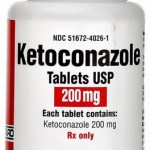- Type of Drug: Antifungal.
- Prescribed for: Thrush and other systemic fungus infections, including candidiasis, histoplasmosis, and blastomycosis. Ketoconazole may also be prescribed for fungus infections of the skin, fingernails, and vagina. High-dose Ketoconazole may be effective in treating fungus infections of the brain. The drug has been studied for the treatment of advanced prostate cancer and Cushing’s syndrome. Ketoconazole shampoo is used for dandruff.
General Information
This medicine is effective against a wide variety of fungus organisms. It works by disrupting the fungus cell’s membrane, ultimately destroying the cell.
Ketoconazole Cautions and Warnings
Ketoconazole has been associated with liver inflammation and damage: At least 1 of every 10,000 people who take this drug will develop this condition. In most cases, the inflammation subsides when the drug is discontinued.
Do not take Ketoconazole if you have had an allergic reaction to it.
It should not be used to treat fungus infections of the nervous system because only small amounts of the drug will enter that part of the body.
In studies of Ketoconazole in prostate cancer, 11 people died within 2 weeks of starting high-dose Ketoconazole treatment. The reasons for these deaths are not known but may be related to the fact that the medication can suppress the natural production of adrenal corticosteroid hormones.
Ketoconazole reduces male testosterone levels and reduces the amount of natural corticosteroid hormone produced by your body.
On rare occasions, people taking Ketoconazole for the first time experience serious, life-threatening reactions including itching, rash, and breathing difficulty. Victims of this rare reaction must be given emergency treatment at once.
Possible Side Effects
- Common: nausea, vomiting, upset stomach, abdominal pain or discomfort, itching, swelling of male breasts. Most of these side effects are mild, and only a small number of people (1.5 percent) have to stop taking the drug because of severe side effects.
- Less common: headache, dizziness, drowsiness or tiredness, fever, chills, unusual sensitivity to bright light, diarrhea, male impotence, and reduced levels of blood platelets. Reduced sperm counts have been associated with Ketoconazole, but only at drug doses above 400 mg a day.
Ketoconazole Drug Interactions
• Antacids, histamine H2 antagonists (including Cimetidine, Ranitidine, and others), and other drugs that reduce the acid in the stomach will counteract the effects of Ketoconazole by preventing it from being absorbed. This drug requires an acid environment to pass into the blood.
• When ketoconazole is taken together with Rifampin, the effect of both drugs may be reduced.
• The combination of Isoniazid and Ketoconazole causes a neutralization of the Ketoconazole’s effect. These interactions occur even when drug doses are separated by 12 hours.
• Ketoconazole increases the amount of Cyclosporine in the bloodstream and the chances for kidney damage caused by Cyclosporine. It also increases the effect of oral anticoagulant (blood-thinning) drugs. Ketoconazole increases the blood levels of Cisapride and of the antihistamines Terfenadine and Astemizole, which leads to an increased chance of developing serious cardiac side effects from those drugs.
• Taking Ketoconazole and Phenytoin can affect the amount of either medicine in your blood, increasing or decreasing either drug’s effect.
• Ketoconazole may decrease blood Theophylline levels, possibly precipitating an asthmatic attack. Your doctor can adjust your Theophylline dose.
• Ketoconazole may Increase the amount of oral corticosteroid drug absorbed into the bloodstream while slowing its removal from the body, possibly leading to more corticosteroid side effects.
Ketoconazole Food Interactions
Food stimulates acid release, and Ketoconazole is absorbed much more efficiently when there is acid in the stomach. Take Ketoconazole with food or meals to improve absorption and avoid stomach upset.
Usual Dose
Tablets
- Adult: 200 to 400 mg taken once a day. Dosage may continue for several months, depending on the type of infection being treated.
- Child (age 2 and older): 1.5 to 3 mg per pound of body weight once a day.
- Child (under age 2): do not use.
Cream
Apply to affected and immediate surrounding areas 1 or 2 times a day for 14 days.
Overdosage
The most likely effects of Ketoconazole overdose are liver damage and exaggerated side effects. Victims of overdose should immediately be given Bicarbonate of Soda or any other antacid to reduce the amount of drug absorbed into the blood. Call your local poison control center for more information. If you take the victim to a hospital emergency room for treatment, ALWAYS bring the prescription bottle with you.
Ketoconazole Special Information
If you must take antacids or other ulcer treatments, separate doses of those medicines from Ketoconazole by at least 2 hours. Anything that reduces your stomach-acid levels will reduce the amount of Ketoconazole absorbed into the blood.
This drug can cause headaches, dizziness, and drowsiness. Use caution while doing anything that requires intense concentration, like driving or operating machinery.
Call your doctor if you develop pains in the stomach or abdomen, severe diarrhea, a high fever, unusual tiredness, loss of appetite, nausea, vomiting, yellow discoloration of the skin or whites of the eyes, pale stools, or dark urine.
If you forget to take a dose of Ketoconazole, take it as soon as you remember. If it is almost time for your next regularly scheduled dose, space the missed dose and the next dose 10 to 12 hours apart. Then go back to your regular schedule. Do not take a double dose.
Ketoconazole Special Populations
Pregnancy/Breast-feeding
Ketoconazole, in doses larger than the maximum human dose, has caused damage to developing animal fetuses. This drug should be avoided by pregnant women or women who may become pregnant unless the potential risk of the drug has been carefully weighed against any possible benefit.
Nursing mothers who must take Ketoconazole should bottle-feed their infants because the drug passes into breast milk.
Seniors
Older adults may take this medication without special restriction. Follow your doctor’s directions and report any side effects at once.

